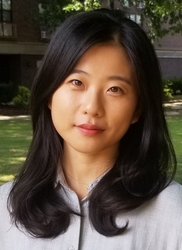Student Spotlight: PhD Student Ryungha Oh
by Eda Aker
March 13, 2023
 Before coming to Yale to complete her PhD, Ryungha Oh did not know that she would study spatial economics. Now as a fifth-year PhD student and recipient of EGC's Sylff Fellowship, she’s co-authoring papers with Yale faculty members on the subject.
Before coming to Yale to complete her PhD, Ryungha Oh did not know that she would study spatial economics. Now as a fifth-year PhD student and recipient of EGC's Sylff Fellowship, she’s co-authoring papers with Yale faculty members on the subject.
Growing up in South Korea, Oh felt a natural inclination toward academia. Both of her parents majored in science-related fields as undergraduates, and her father attended graduate school. Her love for economics came gradually, and served as the bridge between STEM methodology and social impact.
As she started to look at graduate programs, Oh heard from other Asian friends studying in the US that Yale was collaborative and felt a “distinctive” and “welcoming” atmosphere when she visited.
“My first impressions turned out to be consistently true throughout my time here,” Oh said. “At Yale, I had the unique ability to absorb what the faculty did and this allowed me to learn how to make progress on my own and cope with challenges. Everyone here encouraged me to speak out and were helpful in so many ways.”
Understanding the urban wage premium
Oh’s most recent independent project explores the ‘Urban Wage Premium,” which is when workers in larger cities earn higher average wages than workers in smaller cities. The research explores how spatial sorting — the process of how firms and workers decide where to settle — contributes to this urban wage gap. Specifically, Oh tries to understand why individuals living and working in larger cities earn higher wages than those in smaller cities.
“Spatial inequality is a phenomenon where productive workers and firms sort into large cities,” Oh said. “With this paper, I hope to provide an explanation that characterizes the wage differences across cities we observe in data through one of the many mechanisms driving spatial inequality.”
Oh’s research model incorporates workers and firms into a single story. Unlike most existing literature which explains this gap by either sorting of workers or firms, Oh’s paper purely focuses on the coordination of workers and firms in generating higher wages earned in cities. Through her model, Oh concludes that workers in large cities earn higher wages because they are more productive.
There are significant policy implications of these findings on the urban wage premium. For instance, government policies that aim to lure workers from large cities to smaller cities, e.g., by giving firms in smaller regions subsidies, will likely increase productivity in these regions. Such policies can have a significant impact on welfare gain and total output: workers in regions receiving subsidies have an easier time finding jobs with potentially higher wages, and workers in larger cities have less competition in their labor market environment.
Collaborating on firm sorting and spatial inequality
Oh has collaborated with several of her professors and embarked on various research projects related to spatial economics. One such collaboration last year led to a joint research paper with Yale Associate Professors Ilse Lindenlaub and Michael Peters: “Firm Sorting and Spatial Inequality.”
The researchers’ model highlights that a firm’s location choices are guided by a fundamental trade-off: settling in productive locations increases productivity but simultaneously limits firm size because of tougher labor market competition. Oh and her coauthors’ findings showed that better firms indeed settle in more productive locations and that firm sorting amplifies spatial inequality. Using administrative data, they quantified the role of firm sorting for wage differences between East and West Germany, and found that firm sorting explained around 20% of the wage gap.

Research collaborations between students and faculty members like this at Yale allow both students and faculty to mutually benefit from the exchange of new ideas and energy. “Collaborating with Ryungha has been an outstanding experience. This paper immensely benefited from her knowledge and creativity at every stage and we have learned a lot from her. Students like her make Yale such a unique place,” Professors Lindenlaub and Peters said.
Expanding the intersection of research projects at Yale and beyond
Nearing the end of her PhD program, Oh remembers being daunted as a first-year by independently preparing academic materials and conducting research in a foreign language. By her second year, she felt more settled in, and recalls that her classes, conversations, and advisor meetings were immensely helpful as she formulated research questions.
“I am interested in understanding where spatial inequality comes from instead of just documenting that it exists” Oh said. “Spatial inequality at its core is made up of intertwined mechanisms. Each of my papers focuses on a different mechanism, and collectively works to wrap up the complexities of spatial inequality.”
Currently, Oh is working with co-author Jaeeun Seo on a new paper exploring the causes of the agglomeration of services — the phenomenon of consumer services being concentrated in space — using evidence from Seoul.
Oh looks forward to continuing her academic research on spatial economics beyond Yale. “The fact that spatial inequality is very large, persistent, and happening all over the world makes it an important topic to investigate. Many policies try to address issues caused by spatial inequality and promote poor income regions, but it is currently unclear yet whether they are effective or can be justified. I hope that my research can help illuminate some of those questions.”
This article first appeared on the Yale Department of Economics website.